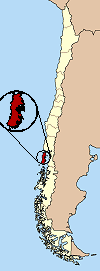|
Tenaún
Tenaún is a Chilean village within the commune of Dalcahue, on Chiloé Island of Chiloé Archipelago. It is located about 36 kilometers from Dalcahue, 28 kilometers from Quemchi and 54 kilometers from Castro. The town of Tenaún is accessed from the north, by a road that begins on the route between Dalcahue and Quemchi. This land route, built in 1950, allowed the integration of the town to the rest of the island. The town of Tenaún was founded in the 18th century, being one of the oldest in Chiloé. It was part of the larch trade route and since its inception was an intermediate port between Chacao and Castro. In the 19th century, it experienced an urban boom as a result of logging that favored its development. Thanks to the historical relevance of the forest trade is that many of the houses of the town were built with larch coatings. The urban landscape is composed of the edge-sea, a longitudinal plane parallel to the coastline. The urban order of the town has as axes: the c ... [...More Info...] [...Related Items...] OR: [Wikipedia] [Google] [Baidu] |
Church Of Tenaún
The Church of Tenaún or Church of Our Lady of Patrocinio (Patronage)— — is a Catholic church Church may refer to: Religion * Church (building), a place/building for Christian religious activities and praying * Church (congregation), a local congregation of a Christian denomination * Church service, a formalized period of Christian comm ... located in the town of Tenaún, Communes of Chile, commune of Dalcahue on the Chiloé Archipelago, Los Lagos Region, southern Chile. The Church of Tenaún was declared a National Monuments of Chile, National Monument of Chile in 1999 and is one of the 16 Churches of Chiloé that were declared UNESCO World Heritage Sites on 30 November 2000. “Tenaún” means “three peaks” in the native language of the area, and it is believed that the church’s three pillars symbolize this. The patron saint of the Church of Tenaún is Our Lady of Patrocinio, whose feast day is celebrated on January 30. This church leads the parish of Patrocin ... [...More Info...] [...Related Items...] OR: [Wikipedia] [Google] [Baidu] |
Chiloé Archipelago
The Chiloé Archipelago (, , ) is a group of islands lying off the coast of Chile, in the Los Lagos Region. It is separated from mainland Chile by the Chacao Channel in the north, the Sea of Chiloé in the east and the Gulf of Corcovado in the southeast. All islands except the Desertores Islands form Chiloé Province. The main island is Chiloé Island. Of roughly rectangular shape, the southwestern half of this island is a wilderness of contiguous forests, wetlands and, in some places, Chilean Coast Range, mountains. The landscape of the northeastern sectors of Chiloé Island and the islands to the east is dominated by rolling hills, with a mosaic of pastures, forests and cultivated fields. The archipelago is known within Chile for its distinctive folklore, chilote mythology, mythology, potatoes of Chiloé, potatoes, cuisine of Chiloé, cuisine and unique Chilotan architecture, architecture. The culture of Chiloé is the result of mixing of Huilliche people, Huilliche, Culture of ... [...More Info...] [...Related Items...] OR: [Wikipedia] [Google] [Baidu] |
Cartel Hitos Históricos De Tenaún
A cartel is a group of independent market participants who collaborate with each other as well as agreeing not to compete with each other in order to improve their profits and dominate the market. A cartel is an organization formed by producers to limit competition and increase prices by creating artificial shortages through low production quotas, stockpiling, and marketing quotas. Jurisdictions frequently consider cartelization to be anti-competitive behavior, leading them to outlaw cartel practices. Cartels are inherently unstable due to the temptation by members of the cartel to cheat and defect on each other by improving their individual profits, which may lead to falling prices for all members. The doctrine in economics that analyzes cartels is cartel theory. Cartels are distinguished from other forms of collusion or anti-competitive organization such as corporate mergers. Advancements in technology or the emergence of substitutes can undermine cartel pricing power, leadi ... [...More Info...] [...Related Items...] OR: [Wikipedia] [Google] [Baidu] |

